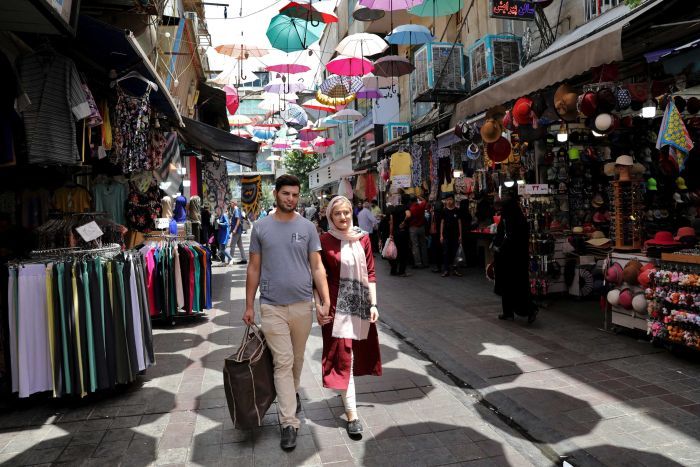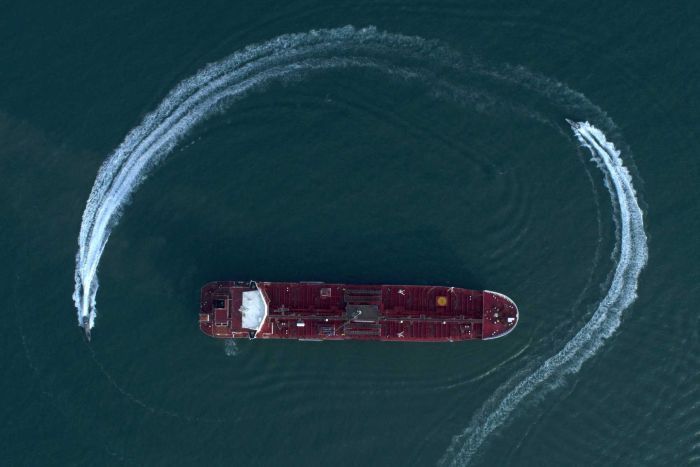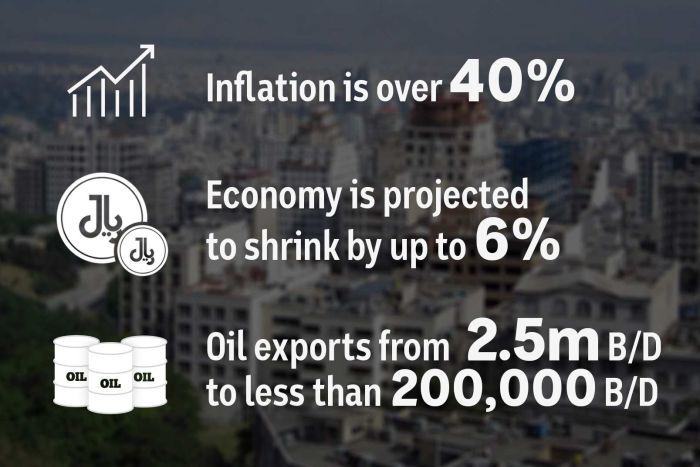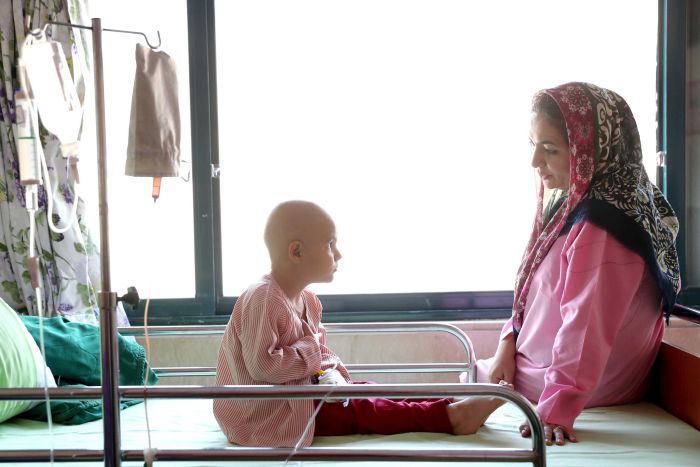
'War is the only solution': What Iranians think could happen next in the US conflict
Posted

Photo:
Iran’s large middle class has been hit hard by the fallout from unprecedented US sanctions. (AP: Ebrahim Noroozi)
The showdown between Washington and Tehran has upended the lives of Iranians, as US President Donald Trump’s “maximum pressure campaign” rages on.
Key points:
- Iran’s inflation has surpassed 40 per cent and the economy is projected to shrink by 6 per cent this year
- Activists in Iran estimate more than 60 per cent of Iranians are now living below the poverty line
- But many economic problems in Iran predate sanctions imposed by the Trump administration
Families in Iran have been hit hard by the fallout from unprecedented US sanctions that began in August last year, targeting Iran’s key industries including oil, metal, the banking sector and individuals within Iran’s leadership.
As a result, the national currency has collapsed, inflation has accelerated eroding wages and a sharp spike in housing prices — which more than doubled in a year — has uprooted tenants and made home ownership unattainable for most.
This week, Mr Trump announced plans to “substantially increase sanctions on the country of Iran”, following a drone and missile attack on Saudi oil facilities that temporarily slashed the kingdom’s oil production in half.
Iran’s Foreign Minister Javad Zarif hit back, accusing the US of “deliberately targeting ordinary citizens” in an act of “economic terrorism”.
The escalation of tensions between the US and Iran — triggered by the Trump administration’s withdrawal last year from Iran’s 2015 nuclear deal — show no signs of easing, and European mediators trying to defuse the situation keep coming up short.
“The sanctions have been devastating for the general population who is struggling to make ends meet,” Ali Vaez, Iran project director for International Crisis Group, told the ABC following the last round of sanctions imposed on Iran in July.
And as new sanctions take hold, the situation for Iranian families seems set to worsen.
Inflation leaves families struggling to survive on less

Photo:
Amid tit-for-tat seizures of several oil tankers, the two nations have also shot down each others’ drones. (AP: Morteza Akhoondi/Tasnim News Agency)
Relations between Tehran and Washington have been on a rapid downhill spiral since June, with the US blaming Iran for multiple attacks on foreign tankers, as well as regional drone and rocket strikes.
Amid tit-for-tat seizures of several oil tankers, the two nations have also shot down each others’ drones.
US Secretary of State Mike Pompeo called the most recent attacks on Saudi pipelines an “act of war”.
Iran has denied involvement in any of the attacks, and a fierce war of words has been playing out with Mr Trump threatening “obliteration” by US forces that were “locked and loaded”, and Iran’s President Hassan Rouhani saying the White House was “afflicted by mental retardation”.
But Mr Trump has repeatedly said he does not want war and has so far relied heavily on economic means in his “maximum pressure campaign” against Iran.
By November last year, Mr Trump’s sanctions on Iran had reached the same level as those under the Obama administration — just before negotiating the Iran nuclear deal.
Since then, the sanctions have become even more expansive, and it is the Iranian people who are paying the greatest price.
Iran’s economy is now in freefall with inflation officially over 40 per cent, although many experts suspect the actual figure is much higher.
The IMF projected Iran’s economy will shrink by about 6 per cent this year.
Oil exports have plummeted from around 2.5 million barrels a day to fewer than 200,000 barrels since the sanctions were introduced last year.
The Iranian rial has also gone from 32,000 to the US dollar at the time of the 2015 nuclear deal to around 128,000 rials to the dollar according to foreign exchange website Bonbast.com, highly affecting prices of imported goods and straining the budgets of Iranian families to breaking point.

Photo:
Families in Iran have been hit hard by the fallout from unprecedented US sanctions that began in August last year. (ABC News: GFX/Jarrod Fankhauser)
Middle-class couples like Maryam Alidadi and her husband, a mechanic, said they used to rent a spacious apartment in central Tehran and enjoyed occasional restaurant meals and holidays abroad.
Now they are barely hanging on, even after drastically cutting spending.
The couple said they had to sell their car, move to a cheaper neighbourhood and borrow from friends and family.
“Right now, this is the most difficult period ever,” said Ms Alidadi’s 58-year-old mother, Shahla Allahverdi, reflecting on the Islamic Republic’s 40-year history.

Photo:
Iranian families are paying the greatest price as Iran-US tensions escalate. (AP: Vahid Salemi)
A professor from Tehran University, who could not be named for security reasons, said while the official unemployment rate was around 15 per cent, in reality it was closer to 35 per cent, even among educated Iranians.
“Most of the factories have stopped working or they have been forced to make many of their employees redundant,” he said, adding that poverty and suicide have been rising, but exact numbers are hard to come by.
“In Iran, official figures are created by government employees and they are not reporting the correct number,” he told the ABC.
“But from the observation of sociologists and activists in Iran, more than 60 per cent of the Iranian people are now living below the poverty line.”
Corruption and sanctions block access to medical supplies

Photo:
Prices of imported medicines have also soared as the national currency tumbled. (AP: Ebrahim Noroozi)
While the United States insists that medicines and humanitarian goods are exempt from sanctions, restrictions on trade have made many banks and companies across the world hesitant to do business with Iran, fearing punitive measures from Washington.
As a result, prices of imported medicines have soared and even medicines manufactured in Iran are tougher to come by for ordinary Iranians as wages continue to fall while inflation soars.
Iranian-American physician Reza Behrouz said US sanctions have “undoubtedly had an impact” on the availability and the cost of pharmaceuticals and other medical services in the country, but added, “these impediments are not exclusively due to US sanctions”.
“Key among the contributing factors — perhaps much more significant than the sanctions — are corruption within the regime’s [sectors] responsible for import, manufacturing, and distribution of medications,” said Dr Behrouz, an associate professor at the University of Texas School of Medicine.
This corruption included hoarding supplies, blocking imports to sustain a monopoly, and manufacturing low-quality pharmaceutical products, he said, but the Iranian Government used propaganda to divert blame.
“A significant part of what we hear in Western media regarding the scarcity of medications in Iran are propaganda … aiming to exacerbate and inflame international sentiment and create outrage.”

Photo:
Many economic problems in Iran predate sanctions imposed by the Trump administration. (Reuters: Nazanin Tabatabaee)
The Tehran professor said the situation with the US had also been used “to fight against democracy inside Iran and to fight against all the opposition”.
He said arrests of activists had been increasing with many receiving decades-long sentences and any kind of activities that were not in line with the ruling party could lead to an arrest.
The professor said because they couldn’t judge them based on their anti-government activity they accused them of spying.
Iranian documentary maker Mohammadreza Shams, who moved to Australia two years ago, told the ABC tensions with the West have also been presented to the people as an excuse for shortcomings in Iranian policy.
“They don’t know how to manage the country,” he said.
“Sanctions give them an excuse to give to the people to explain their own mismanagement.”
‘Two stupid leaders’ could make ‘a very bad situation’

Photo:
Some Iranians fear that tensions with the US could led to support for a more radical leader in the next elections. (Reuters: Jared Sabins/US Army/Handout)
In a report last year, the International Crisis Group said sanctions could empower harder-line officials in the Islamic Republic.
Mr Shams agreed, saying many Iranians feared that tensions with the US could lead to support for a more radical leader in the next elections.
“Some with more extreme views see [President] Rouhani as fearful and weak when it comes to the US — they believe when the US makes a move, they must [hit back] 10 times harder,” he said.
“Iran knows how to make a mess in the region — if the US and Iran have two stupid leaders, we are going to see a very bad situation for the people in the region and especially for Iranian people.”
Mr Shams said people in Iran were also divided about the possibility of a fully-fledged conflict with the US.
“Some people hope war doesn’t happen but they don’t have any solution — others think war is the only solution,” he told the ABC.
“Many hope that if a war happens it could lead to a change in government.”
Meanwhile, Mr Shams said some in the ruling party and Iran’s Revolutionary Guards believed a war with the US would unite the people behind the government.
Although many civilians are opposed to the current government, “patriotic feelings in Iran are very strong”, he added, citing an example of how during the Iran-Iraq war, Iranian pride united the country despite frustrations with the country’s leadership.
“I think even intellectuals in Iran became very happy when Iran shot down the US drone — all of my friends were very happy,” Mr Shams said, because it showcased “Iran’s power” and ability to answer to US actions.
‘A childish political fight‘

Photo:
Everyday Iranians think Donald Trump and Iran’s Supreme Leader Ayatollah Ali Khamenei are putting their “childish political fight” ahead of human rights. (AP/Reuters)
Many economic problems in Iran predate sanctions imposed by the Trump administration.
At the end of 2017, anti-government protests erupted across the country, venting anger at government policies and corruption, economic conditions, rising food prices and unemployment.
The protests marked the most significant domestic challenge the Iranian Government saw in almost a decade.
Many who spoke to the ABC but asked not to be named said anti-government sentiment was still widespread, while support for the Trump administration was surprisingly common.
The Iranian professor, who could not be named, estimated about 5 per cent of “more radical Iranians” were completely against the US and Mr Trump, “but the majority do not have any problem with Western [culture] or countries”.
He believes, even amid heavy sanctions, anti-Trump sentiment is lower in Iran than among Western countries because “people are confused about how much of what they hear is the propaganda of the Iranian Government and how much is the reality of his acts”.
One photo posted on Facebook from the streets of Tehran showed graffiti that translates to, “Right on, Trump”.
As for the Iranian Government, he said: “It seems they are prepared to fight against the sanctions until the end of Trump’s presidential term”.
“After these two years, the new government in America could be more logical. It could create a new chance to start logical diplomatic communication.”
Mr Shams said inside Iran, people often tried to cope by making light of the situation whenever possible.
“People try to forget the situation by creating funny moments, so you often hear jokes about everyone from the Supreme Leader to Trump.”
But he said neither governments were putting human rights at the forefront of their decisions.
“They are in a childish political fight,” he said, adding that the victims were not politicians but rather ordinary Iranians.
Topics:
defence-and-national-security,
